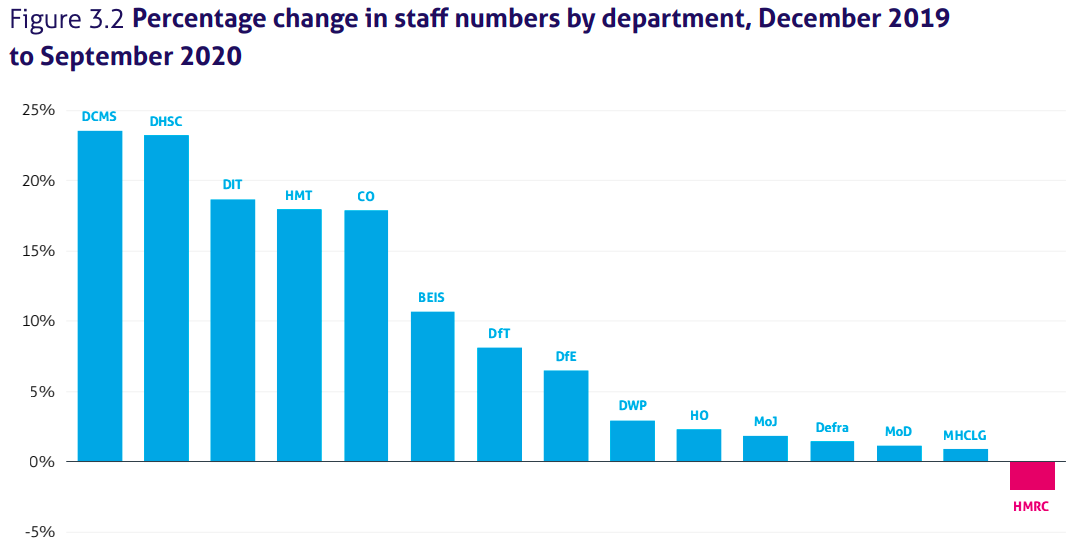A recruitment surge to help the civil service cope with the coronavirus crisis last year means nearly half of the coalition-era staff cuts have now been reversed, an analysis of headcount figures shows.
Nearly 10,000 officials joined the UK home civil service between December 2019 and September 2020, bringing the total headcount up to 430,750, the Institute for Government’s Whitehall Monitor report found.
The report, which analyses staffing changes from the fourth quarter of 2019-20 to the third quarter of 2020-21, noted that in the third quarter of last year alone, staff numbers rose by 4,260.
New staff were recruited via three intensive recruitment "sprints" – one for test and trace, one for the Brexit transition, and one in preparation for winter and coronavirus – alongside normal job campaigns.
While much of the growth was fuelled by the pandemic, it also followed a longer-term trend. Civil service numbers have been rising since the 2016 referendum, as departments worked to prepare for the UK’s departure from the EU.
Many of those that saw the biggest increases were those hardest hit by coronavirus. The Department of Health and Social Care’s headcount rose by 23%, with a surge in the three months from June 2020 as staff worked to develop NHS Test and Trace.
The Treasury and Cabinet Office both saw significant bumps in staff numbers, as did the Department for Business, Energy and Industrial Strategy, which has been delivering business-support schemes during the pandemic, as well as handling Brexit responsibilities and preparations for the COP26 climate summit.
Although the proportional increase was much lower at the Department for Work and Pensions – 3% – the rise represented 2,040 extra staff as it is one of Whitehall’s largest departments. DWP has been hiring extra work coaches and moving back-office staff to frontline roles to deal with a huge swell in demand for benefits as people have lost work because of coronavirus.
The Department for Digital, Culture, Media and Sport saw the biggest proportional rise in staff – 24% – and the Department for International Trade grew by 19%.
HM Revenue and Customs is the only department that has not seen an increase in staff since the end of 2019, instead dropping slightly, the report found.

Last year also saw a shift in the distribution of roles, with thousands of civil servants moving from other areas of work, including Brexit preparations, to tackle the pandemic. As of April 2020, around 1,300 civil servants had moved between departments to work on the Covid crisis.
Skills gaps remain
Although the coronavirus outbreak caused huge strain on civil servants’ workload, especially as officials worked to prepare for Brexit and then the end of the transition period, the IfG noted that Brexit preparations had put government in a better position to deal with the crisis than it would have been otherwise.
The increase in staff from 2016 onwards, the experience of preparations for a potential no-deal Brexit and structures put in place to redeploy staff stood the civil service in good stead to respond quickly to Covid-19, the report said.
And the civil service had also gained skills critical to responding to the pandemic, such as analysis, project management and policy skills, in the no-deal planning stages. “In some cases, no-deal plans even ended up being directly applicable to coronavirus, such as those addressing mass unemployment,” the report added.
However, the report noted that a frequently-cited problem with the civil service persisted last year: a lack of science, digital, procurement and other skills.
These skills gaps, as well as constraints on capacity with the added workload of Brexit and Covid-19, the government has relied heavily on consultants and contractors. It has spend more than £175m on contractors and consultancies during the pandemic, the report said.
Cabinet Office minister Michael Gove has said he wants to bolster these skills and reduce consultancy spending as part of the government’s civil service reform.
However the report noted that the pandemic has also slowed progress on efforts to reform the civil service. There are also now “questions about whether the impetus for reform plans can be maintained” following the departure of Dominic Cummings, the prime minister’s former top special adviser and the driving force behind some of those plans – although cabinet secretary Simon Case and chief operating officer Alex Chisholm have demonstrated an appetite for reform.